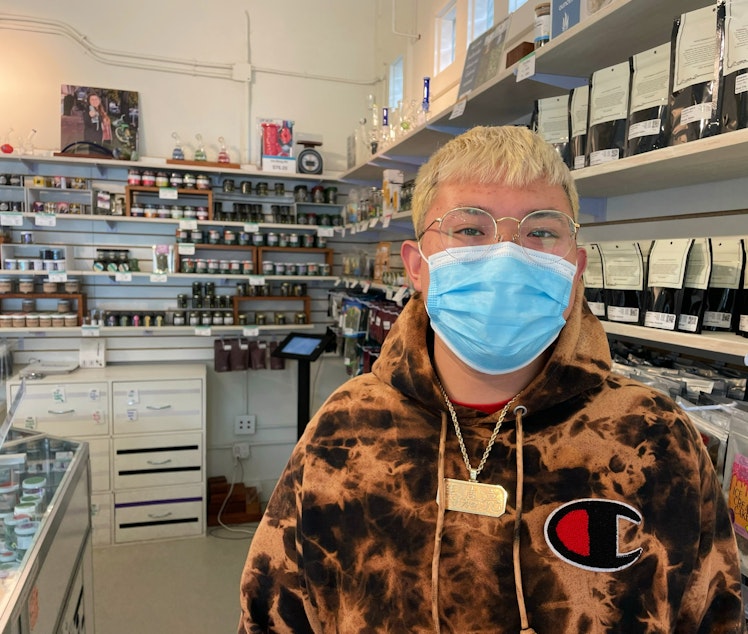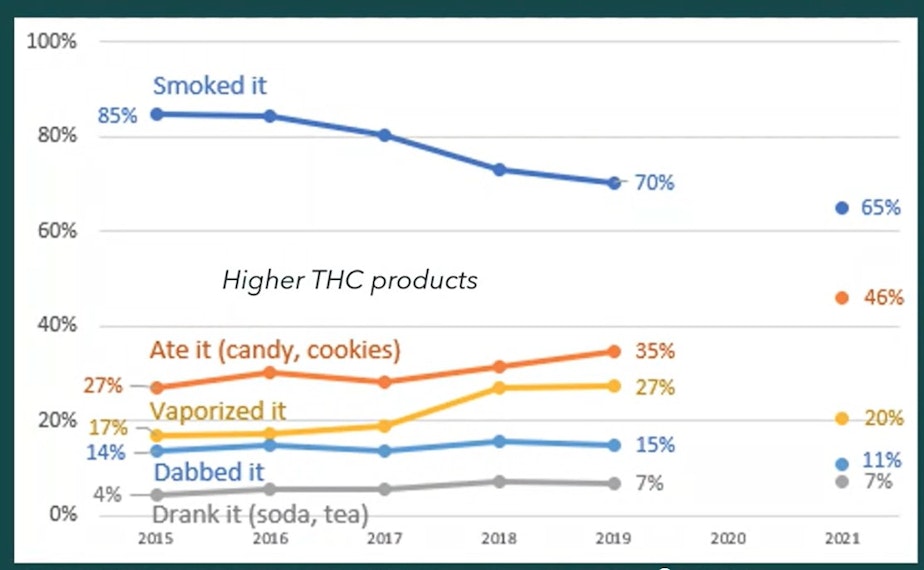Taking stock of WA state’s decade of legal cannabis, and what to expect next

November 2022 marked a decade since Washington voted to legalize recreational cannabis. There was a lot of fanfare — and uncertainty — when voters set the state on this path back in 2012. So what are the big takeaways about our legal cannabis market so far?
Most WA consumers buy their cannabis at state-licensed retail stores
Officials at the state’s Liquor and Cannabis Board said in the decade since voters approved Initiative 502, the recreational cannabis industry has logged over $1 billion in sales and the state has collected $511 million in excise taxes.
“Over the years that’s risen and risen — fallen a little bit in this last year for the first time, probable has to do with issues all businesses are having with respect to supply and inflation,” Board Director Rick Garza said.
Garza said the cannabis industry employs 100,000 people statewide. And the amount people in our state spend on cannabis rivals what we spend on alcohol. Garza said policymakers draw two positive conclusions from Washington’s regulated cannabis industry so far. One is that surveys indicate cannabis use has not increased among kids 18 and under, as some feared. And Garza said the vast majority of cannabis users have embraced the state-regulated system.
“As high as 77-80 percent of those who consume in Washington do so through the legal market,” Garza said. “In some of the other states, and states that are illegal, you’ll see it as low as 44 and 57 percent.”
Sponsored
Garza said in part that’s because prices in the licensed retail stores are really competitive. He said that benefits state tax proceeds, as well as consumers, since there are more safeguards around regulated products.
Consumption of cannabis has increased among WA adults since legalization, including frequent use
Julia Dilley is a senior research scientist with the Multnomah County Health Department. She and other researchers recently presented their cannabis research to the Liquor and Cannabis Board.
"We have seen increases in cannabis use among adults," she said.
Dilley said she’s also finding increased cannabis consumption among certain categories, one of them is teenagers who work part-time. Dilley also found that — perhaps unsurprisingly — the odds of cannabis use for people living near the licensed retail stores increased more than 40 percent.
Sponsored
“For the adults living close to, I think it’s within one mile of, cannabis retailers, we did see in those populations increases in any cannabis use, and then frequent cannabis use, so 20 or more days in the past month,” Dilley explained.
But Dilley also said Washington has had some success stories in terms of tackling issues that arose under legalization. She said after the Washington Poison Center raised concerns about children being harmed by ingesting cannabis-infused gummies, the state acted to require warning labels and single-serve packaging for those edibles.
“What we found was this change in packaging rules in Washington State was associated with a 25 percent reduction in edible poisoning reports in children under 10,” Dilley told the Liquor and Cannabis Board.
Researchers are concerned about shift to high-potency THC products
Researchers say some of the highly processed products in today’s licensed retail stores weren’t envisioned when voters legalized cannabis. They’re calling for new measures to prevent consumer harm. They said customers are shifting toward consuming more of those high-potency products like edibles, oils and drinks which contain 50-80 percent, or sometimes even 90 percent, THC. (THC is the psychoactive compound in cannabis. Dried flower typically contains between 10-25 percent THC.)
Sponsored

Beatriz Carlini is director of the Cannabis Education and Research Program at the UW’s Addiction, Drug & Alcohol Institute. Carlini finds that there’s disproportionate use of these high-potency products among certain populations, including people who self-report having mental health issues. Carlini said people with psychosis are particularly at risk; they have much worse outcomes when they use cannabis, in terms of their symptoms and adherence to medication.
“You also see historically marginalized groups — in the case of our study we found Latinos were more likely to use these products,” she said. Carlini said the cannabis industry and regulators should act to disincentivize consumption of high-potency concentrates, especially in more vulnerable populations, and educate consumers about portion size, just as there’s been public education about the differences between beer, wine and hard alcohol.
“You cannot have the same amount of whiskey as you have for beer and have the same buzz. It’s going to be completely different,” she said.
Carlini said she supported legalization. But she says the regulatory framework didn’t anticipate these new products and she wants legislators to take action to curb their use, through public education and higher taxes, for example.
Sponsored
“I’m proud to live in a state that had the courage to try something new," she said. "And the time for correcting these issues is now; this is the time we can change things.”
Cannabis industry could back higher taxes on high-THC products
The Washington CannaBusiness Association rejects calls for any kinds of prohibitions on high-potency products. They say that will have unintended consequences, and fuel a black market. But they are discussing how to discourage some of the consumption of high-potency products with higher taxes.
“Most interesting, and not fully formed yet, but a lot of folks have talked about is potentially differential tax rates for higher potency products versus lower potency, and that’s a conversation that we’re starting to have with legislators,” explained Vicki Christophersen, who heads the Washington CannaBusiness Association.
Social equity licenses and new restrictions on hemp-derived THC
Sponsored
Back in 2012 Washington had no pathway for people harmed by the war on drugs to enter the legal cannabis business. Now, in the wake of the racial justice protests in 2020, there’s recognition that people of color and their communities bore the brunt of prosecutions for cannabis use, and then were largely shut out of the legal business.
Regulators said they’re trying to make amends for that. They have already announced plans to award unused licenses to social equity applicants. Next year they’re going to ask lawmakers to approve additional licenses, based on census data on population growth, to go specifically to social equity applicants.
In addition, the Liquor and Cannabis Board will ask legislators for authority to regulate all THC. Currently state law applies to only one component, Delta 9 THC, the form found in licensed retail stores. But a loophole in the federal farm bill that legalized hemp has more recently allowed for the production and sale of Delta 8 THC, which is also impairing, and is currently being sold in some convenience stores without any age restrictions.
“I saw it in my own town at multiple stores and those products are not limited by age, so anyone can buy them, including children,” Christophersen said.




